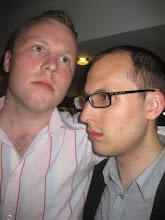Well I think it’s time to extricate myself from the (admittedly interesting) discussion about the role of ‘theory’/Theory/theory in our lives, and instead maybe write something a little different, largely about the academic self-flagellation that is the course I’m taking this term in ‘Viking Poetry’. This post comes to you, by the way, from an East Coast train from York to London, hurtling along (or so I’m reliably informed by the little widget that’s helpfully appeared on my desktop) at somewhere between 68-72mph, with 174 minutes of my journey remaining – plenty of time!
I’m taking two literature modules this term, a course on Viking Poetry taught by Matt Townend and Fictions of Audacity, which is a course on ME romance with Nicola McDonald. Nicola’s module is very similar to one she teaches on the undergraduate English course here at York, though I missed out on that since I ‘ticked the wrong box’ on the module selection form, ending up in Gabriella Corona’s ‘The Good, The Bad and The Holy – Medieval saints’ lives’, instead of Nicola’s ‘From Gawain to John Wayne: popular romance’ (it was, I think, the western connection that threw me!) Still, I’m really enjoying doing something that’s a little later than my usual milieu, ie something that’s not in OE!
The other module, Viking Poetry, I’m a little more wary of. Of course, there’s nothing wrong with the course, per se, and it’s taught by Matt Townend, who’s not only a great expert on Old Norse (a language I’m valiantly trying to force into my mind-hoard), but also on Skaldic poetry in general. I suppose what worries me is that I’m taking a course which hopes to engage with poetic form itself – that’s just not my bag, baby! For the first seminar, last week, we were talking about Snorri Sturluson’s Edda and, more specifically, were trying to make sense of his poetic form, including his use of kennings and heiti and what their significance might be. I was pleasantly surprised at the breadth of our discussion, if I’m honest, since we did (fortunately) touch upon some of the ideological complexities of a text in which a late-Medieval Christian writer brings together and attempts to reconcile stories of the Trojan Diaspora, Norse mythological stories and Christian creation mythology. Snorri’s success in this, I think, varies. The Edda is an impressively eclectic text – important for its preservation of both Norse mythologies but obviously also for its treatises on Old Norse verse forms. Moreover, Snorri’s argument that the mythology is as vital to the verse form as the verse form itself is to the mythology is a compelling one. To my mind, it explains a lot of the Christian reclamation of pagan language, so that ‘Alfadr’ can be used to describe both Odin and, later, a Christian God or, in Old English, the word ‘Dryhten’ comes to mean ‘the Lord’ rather than ‘a lord’ in its secular sense. It also serves to provide evidence of the developing paradigm for the acceptance of pagan elements into Christian discourse in the form of, for example, royal genealogies. Thus Asser can trace Alfred’s lineage from his literal, living-memory, parentage, through his genealogical associations to folkloric and mythological figures such as Woden and Scyld Scefing, to his eventual relationship to the Judaeo-Christian Adam.
Perhaps what we see here is the creation of the ‘third space’, the point at which it no longer benefits to dichotomise the relationship between Christian present and pagan past, but rather to deterritorialise, or to decentre, both paganism (in its many and various forms) and Christianity itself. If ideology, as Žižek has noted, is not a way of providing ‘closures’ but rather is a way of negotiating past, through, or around such limiting ways of thinking, then we see here, in Snorri Sturluson, the complexity of such a negotiation. He is writing through, past and around the ideological ‘closure’ of Christianity and its mutual exclusivity with a pagan past. I almost might have been convinced to leave this post at that point, a kind of hanging assertion, just train-bound thinking aloud, except that my word processor informed me that the post came to exactly 666 words and since I’m incredibly superstitious, the addition of this extra sentence became necessary.
Perhaps more after the PMRG has met on Monday.
Ta-ta for now,
Mike
Thursday, 28 January 2010
Subscribe to:
Post Comments (Atom)

I wouldn't have taken you for the superstitious type ;)
ReplyDeleteFunny things, word counts: I can't seem to get myself to think in those terms, even after four and a half years in the U.K. university system. In the U.S., you're assigned papers by number of pages rather than words - i.e. you have a five-page paper due, or a ten-page one (with the understanding that you must absolutely use Times New Roman or similar in 12 pt. font, double spaced).
I always think of page-counts as quite Harry Potter-ish... how many inches of parchment do we have to write for potions class, again? :p
ReplyDeleteWow, great stuff. Gina Bloom at UC Davis (http://english.ucdavis.edu/people/directory/gbloom) has been working on the history of games -- and cheating at games -- to the early modern period. Might be worth an email...
ReplyDelete